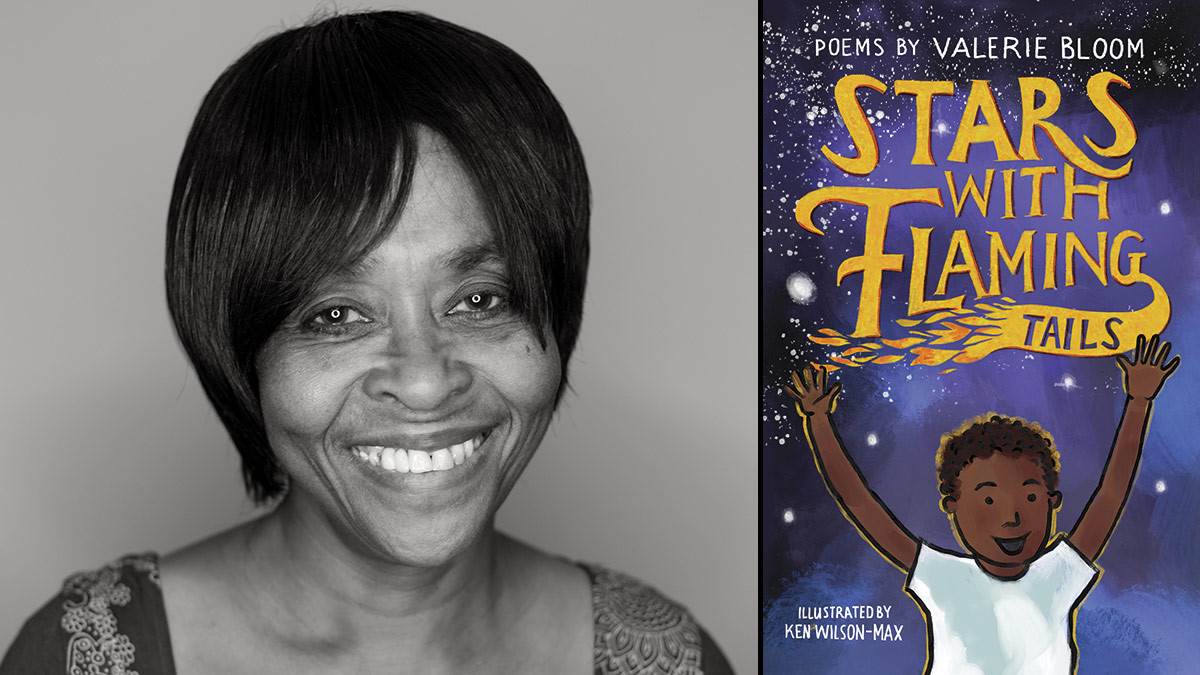Top tips for writing poems from Stars with Flaming Tails author Valerie Bloom
Published on: 6 Ionawr 2021
Valerie Bloom's just released another brilliant book of poetry, Stars with Flaming Tails. Here, she shares her top tips for children who want to write poems - and we talk to her about her new book, too!

Valerie's top tips for writing poems
- Read, read and read some more. One of the best ways to learn is by imitation. That's how babies learn to talk. By reading and listening to other poets, you'll see how they make poems. Don't be afraid to copy the style of poets you admire. After a while, you'll find the style that suits you best. That will be your own 'voice'.
- Keep a little notebook with you where you can jot down ideas for poems. Ideas can come to you in the most unexpected places and if you don't write them down, you'll probably forget them. If you write them down as soon as they pop into your head, then when you come to write you won't need to wonder what to write about. You just have to open your notebook and all those ideas will be there waiting to be turned into lovely poems.
- Make a word bank. Sometimes it's difficult to know how to start your poem. One way is to make a word bank. Write down all the words or phrases that you can think of which have to do with your idea. Another name for that is brainstorming. All the words will come storming out of your brain. Then you just have to decide which ones to use first and how to link them.
- When we write poems, we're making pictures with words so make sure you choose words which will make the picture you want to make. We've got lots of words which can mean the same thing, but make different pictures. For example, if I wanted to tell you how my sister got to the shop, I could say she 'ran'. But if I wanted you to have a better picture of the way she was moving, I would say she 'galloped', or 'sprinted', 'lolloped', 'trotted', 'scampered', 'dashed', 'raced'... each of those words would make a different picture. Something that would help you find the right word is a thesaurus. You'll most likely have one in your classroom library but when you're not at school, you'll find one on your computer or in your public library.
- Poems have rhythm. Rhyme is a good way to put rhythm into your poem, but it's not the only way, and poems don't have to rhyme. Another way you can put rhythm into your poems is to use alliteration (words in your lines that start with the same sound, like 'bouncing baby boy'). You can also use repetition. If you want to use rhyme, a useful book to help you find the best rhymes is a rhyming dictionary. You'll find that on your computer as well.
- Poetry is fun! Have fun with the words. Use words in unusual ways. Make up new words. Experiment. Enjoy.
Talking to Valerie about Stars with Flaming Tails
Congratulations on your new poetry collection! What inspired the writing of this collection?
When I'd finished writing my book of animal poems, Jaws and Claws and Things with Wings, I found that I had quite a few poems which I hadn't used but which I quite liked. I didn't want to write another book of animal poems, but I thought I could probably include them in another collection.
That, and the fact that as I go into schools I'm often asked if I have poems on different topics, inspired the division of the different sections.
What is important when writing poetry for children?
To be aware of the concerns and interests of children. To use language which is suitable to the age group you're writing for, so simple but not simplistic language. That is not to say challenging language cannot be used, but it should be used judiciously.
Include humour. Children like to laugh. Remember that most poetry books are bought for children by parents and teachers, so poems have to appeal to the adults as well as the children.
What do you love most about writing poetry? And what part is the most difficult?
I love words and the fact that poetry allows me to play with them. I love that I'm able to finish a poem in a relatively short space of time compared to writing a novel, and that I can say a lot in a few words. I love the freedom it gives me to say things how I like without worrying about grammar and sentence structure. And I love the rhythms and condensed emotions.
The most difficult part sometimes is getting the exact feeling and or idea I have in my mind on to the page.
You are a seasoned performer of poetry and visitor to schools – what is the funniest thing a child has ever asked you?
I was doing a session in Northern Ireland, and a little Year Four boy got really excited when he heard there was going to be a chance to ask questions after the performance. As soon as I asked if anyone had a question, he jumped up.
'I have a question!'
'Okay, go ahead. What's your question?'
Beaming from ear to ear he asked, 'Why did the chicken cross the road?'
Finally, what were your favourite books as a child?
The first book I fell in love with when I was about four was Are You My Mother? by P.D. Eastman. Later, I discovered and devoured the Chalet School series by Elinor M. Brent-Dyer, and The Famous Five by Enid Blyton!
Topics: Poetry/rhyme, Rhyme, Features






Add a comment